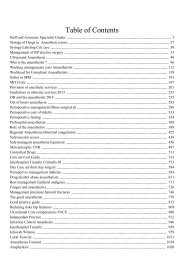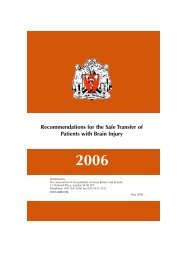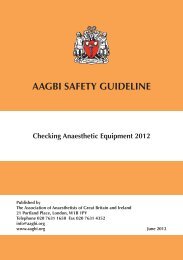TheatrePracticeStandardsGeneric1
Create successful ePaper yourself
Turn your PDF publications into a flip-book with our unique Google optimized e-Paper software.
Generic Theatre Standard No 06G - Management of Patients with<br />
suspected/confirmed TB in the Operating Theatre Department<br />
Standard Statement: All Theatre staff will have knowledge of the requirements for caring for<br />
patients with TB in the operating department to protect self, colleagues and patients from the risk<br />
of health care acquired infection.<br />
Tuberculosis (TB) is an infectious disease caused by the organism Mycobacterium Tuberculosis. It<br />
usually presents as a respiratory disease affecting lungs, larynx, pleura or mediastinal lymph<br />
nodes. It can also affect bones and joints, the gastrointestinal and renal tracts, the central nervous<br />
system or be disseminated through the blood stream. TB can present a health risk to staff if they<br />
become infected from patients; staff can also infect patients.<br />
Resistance to TB drug treatment can develop, and in some cases multi-drug resistance (MDR TB)<br />
develops if patients are not compliant with medication. All patients with TB should have risk<br />
assessments for drug resistance and all patients should be tested for HIV (NICE 2011).<br />
Tuberculosis is a notifiable disease. The medical staff attending the patient have a legal<br />
responsibility to notify a case of TB as soon as the diagnosis is made and a decision to commence<br />
full treatment is taken.<br />
General considerations<br />
Please see RCHT TB Policy Infection prevention and control policy on the management of<br />
patients with tuberculosis<br />
Generic Theatre Standard 04 - Infection control in the Operating Department<br />
• Staff risk People who have active infectious (open) pulmonary TB expel small<br />
respiratory droplets when coughing and sneezing. These small droplet nuclei, carried<br />
by air currents can be inhaled by exposed people and cause infection.<br />
o<br />
o<br />
o<br />
o<br />
o<br />
o<br />
o<br />
o<br />
Pregnant staff should avoid contact with confirmed/suspected TB cases.<br />
It is the responsibility of the Theatre manager manager to maintain an accurate<br />
record of staff (including locum and agency staff) who have had significant exposure<br />
(more than 8 hours) to any suspected or confirmed case of pulmonary TB. This list<br />
will be required in the event of contact tracing and should be forwarded to the<br />
Occupational Health Department on the advice of the Infection Prevention and<br />
Control Team.<br />
The significance and degree of infectious risks to staff should be discussed at the<br />
incident meeting which should be attended by an Occupational Health<br />
Representative.<br />
If a member of staff reports suspicious symptoms, the individual must be referred to<br />
the Occupational Health Department as soon as possible. The Occupational health<br />
Practitioner, after taking a full clinical history, will take appropriate action including<br />
any necessary investigations.<br />
The decision on the staff member’s fitness for work, or advice on restricted duties,<br />
will be a clinical one based on the clinical findings and the areas where he/she<br />
works. Should the clinical findings and/or investigation indicate or confirm TB<br />
infection then referral to the Lead Clinician for TB will be arranged for follow up and<br />
management.<br />
A decision on when the individual is fit to return to work with patients will be made in<br />
conjunction with the Lead Clinician for TB.<br />
The member of staff’s General Practitioner will be kept informed of the outcome.<br />
If a member of staff is confirm to have contracted TB and incident meeting should be<br />
convened to determine further actions required.<br />
40





